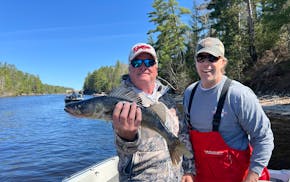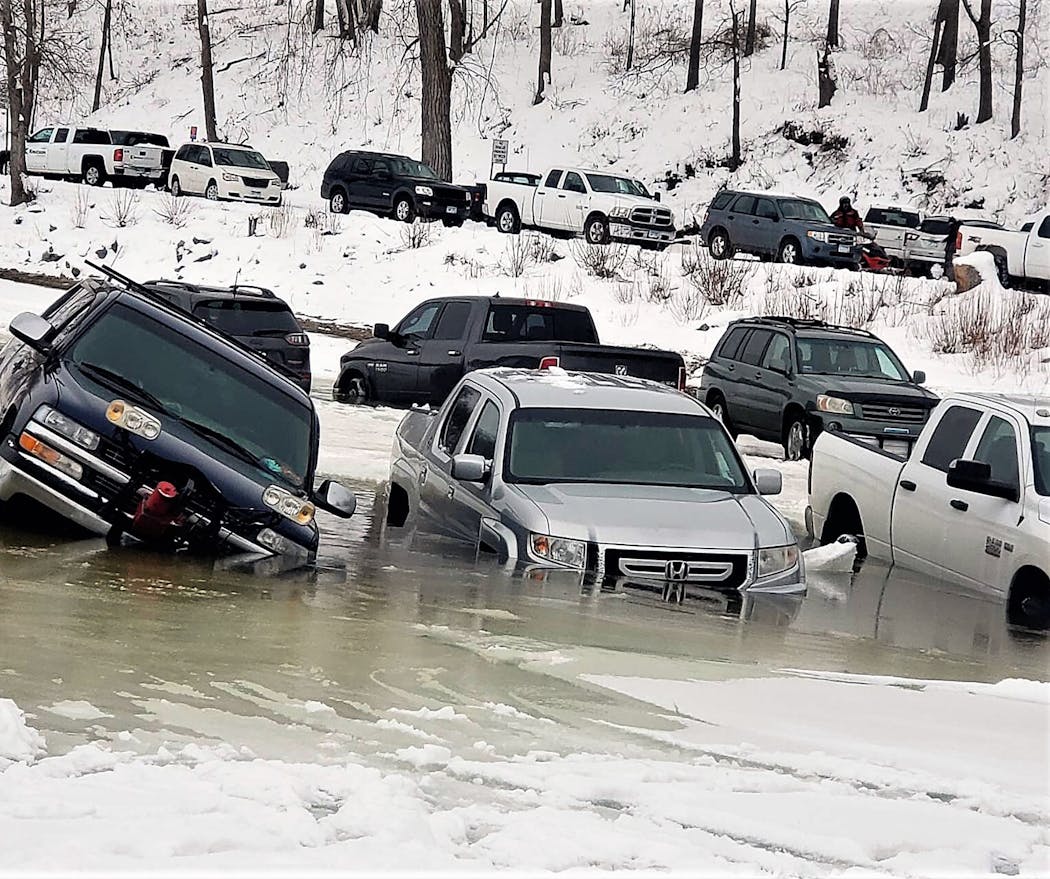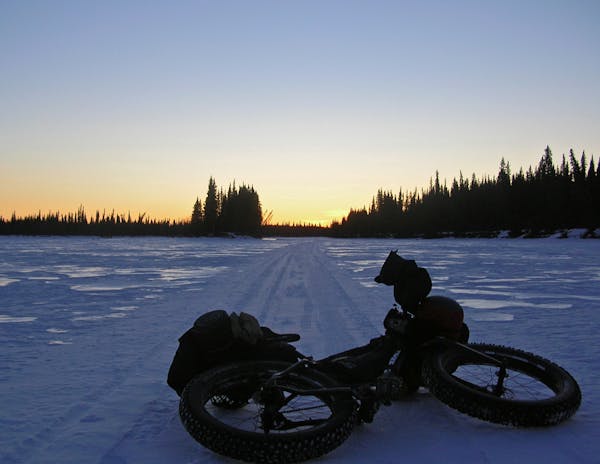With 60 rental ice fishing houses on Lake of the Woods this winter, and about 35 miles of ice roads to plow, Brian Ney knew that he and his crew of eight would be busy last Sunday.
Ney's family had built Adrian's Resort on the big northern border lake in 1952, and he grew up there, not far from Baudette, Minn. In the decades since, Ney, 54, has seen winters of good ice and occasional years when ice has been slow to form in December.
But always, by now, in mid-January, Lake of the Woods ice measures a couple of feet thick, or more, making it a dependable destination for the tens of thousands of winter anglers who seek its bountiful walleyes and saugers.
That morning, Sunday, word hadn't yet reached Ney about the 13 pickups and other vehicles that had gone through the Mississippi River ice near Frontenac, Minn., the day before. Anglers had parked two rows of rigs near shore before venturing onto Lake Pepin by foot or ATV.
By noon that day, water bubbled up under some of the rigs, and six of them had to be winched to shore from 3 to 5 feet of water.
"I thought about parking on the ice myself, but thought, 'Ah, no, I'm just not comfortable,' '' said angler Dallas Barber of Prescott, Wis. "It's just not a good year for ice.''
Terry Thurmer of Terry's Boat Harbor on Mille Lacs agrees. Most winters he plows about 25 miles of Mille Lacs ice roads and charges $15 for access to them.
"We had 6 to 8 inches of good, black ice early this winter, then it snowed, then it rained, with more rain after that,'' Thurmer said. "This year, with the skinny ice we've got, I won't allow any vehicles on my roads. I won't jeopardize people's lives.''
But what's bad for Thurmer's business is good for Jim Staricha's.
Staricha's shop, Northland Towing and Recovery in nearby Isle, Minn., specializes in pulling trucks, ATVs, wheelhouses, road graders — just about anything that can sink — to firm ground after they've fallen through the ice.
"I've pulled eight up from the bottom so far this winter, six from Mille Lacs,'' Staricha said.
All of which was far from Ney's mind Sunday morning when his cell phone rang. About 10 miles from shore, he was told, a zig-zagging crack had opened in the road Ney and his crew had plowed, revealing a gap of water 9 miles long and about 8 inches wide.
Worse, two trucks about a mile apart had broken through the fractured ice early that morning, in the dark. One was headed to shore, the other was driving farther onto the lake.
"This happened about seven and half miles from Pine Island,'' Ney said. "We had real good ice out there, about 25 inches. But Saturday night was a lot colder than it had been, getting down to about zero, and ice contracts when cold temperatures follow warm. That must have caused the crack.''
At first, no one thought either truck would sink. Only their front axles had broken through, and there was enough safe ice behind them for plow trucks to jerk them to safety.
One of the pickups was driven by Todd Schoeben, owner of The Walleye Bite Company, a popular food truck he keeps on the ice on Adrian's plowed road about 11 miles past Pine Island.
"Two of our trucks hooked onto his truck,'' Ney said, "and a third truck from another resort hooked onto them. They all pulled together, and they got it out.''
The other pickup was more precariously perched, with its front end seemingly held up by a floating chunk of ice. "Still, I thought we would get it pulled out,'' Ney said.
A small crowd gathered near the truck as its angle grew ever more vertical. A plan was made to yank it to safety using multiple rigs, and a tow strap was hooked to its rear bumper.
Then the truck sunk, nose first.
"I can't remember a truck ever going through the ice up here at this time of year,'' Ney said.
Adding to the day's frenzy, a substitute road needed to be plowed parallel to the one with the zig-zagging crack. The Lake of the Woods ice is particularly rough this winter, and the alternative route would need to intersect a score of tributary roads, each bordered by steep snowbanks.
"It was rough going, but we plowed nine miles of new road,'' Ney said.
Not long afterward, halfway down the state, Staricha's cell phone rang. It was an insurance adjuster, asking for a bid to pull a pickup from the bottom of Lake of the Woods.
Studying the particulars of the mishap, the recovery, Saricha figured, wouldn't be tricky. Thirty-three feet of water? No problem. And while the truck would be partly submerged in mud, the tow strap appended to its bumper would float upward.
"Using an underwater camera and a gaff, we should be able to hook the strap,'' Saricha said. "If we can, we won't have to bring a diver, which would keep costs down. After we winch the truck onto the ice, we'll load it onto a flatbed wrecker. The insurance company will total it and it'll be sold for parts.''
Whether he or another outfit gets the bid, the cost should be under $10,000, Saricha said.
Meanwhile, walleye and sauger action continues to be good on Lake of the Woods. And good, too, on Mille Lacs.
Staff writer Tony Kennedy contributed reporting to this column.

Anderson: Tails wagging, DNR officers' dogs find lost people and missing evidence
Anderson: Punish poachers more
Anderson: The Chainsaw Sisters Saloon is gone, but the Echo Trail is still a pathway to possibilities




